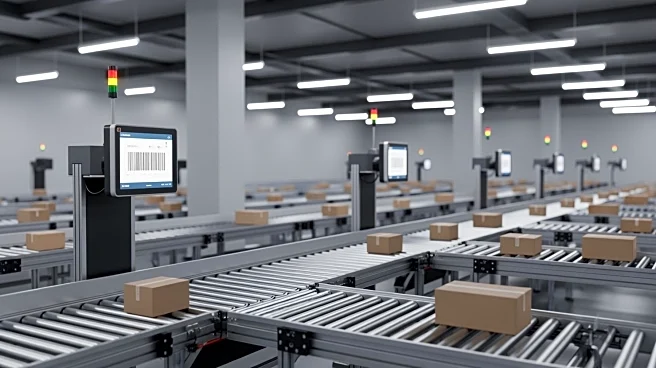What's Happening?
ODW Logistics has implemented Zebra Symmetry Fulfillment to optimize its e-commerce operations, expecting a 42% improvement in pick rates. This adoption involves next-generation Zebra Connect Fulfillment autonomous mobile robots (AMRs) and decoupled bakers'
rack carts, transitioning from a pick-to-tote to a pick-to-shipper model. The shift aims to increase units picked per hour, reduce costs per unit, and improve throughput. By leveraging Zebra's intelligent automation, ODW Logistics enhances cart accumulation at induction and drop-off points, optimizing robot and labor utilization. This approach reduces the number of robots required by up to 30% compared to payload-integrated solutions, increasing pick density and cutting shipping costs.
Why It's Important?
The implementation of Zebra Symmetry Fulfillment represents a significant advancement in warehouse automation, offering ODW Logistics the ability to scale operations efficiently while maintaining cost-effectiveness. This move aligns with broader industry trends towards modernization and automation, as highlighted in Zebra's Warehouse Vision Study. By improving pick rates and reducing operational costs, ODW Logistics can enhance its competitive edge in the e-commerce sector, meeting growing consumer demands for faster and more reliable order fulfillment. The adoption of intelligent automation solutions also reflects the increasing importance of technology in transforming traditional logistics and supply chain processes.
What's Next?
As ODW Logistics prepares to open a new facility in 2026, the current trial phase of Zebra Symmetry Fulfillment will provide valuable insights to refine and scale automated operations. The company may continue to explore additional automation technologies to further enhance efficiency and flexibility across its fulfillment network. Industry stakeholders, including other logistics providers, may observe ODW Logistics' progress and consider similar automation strategies to remain competitive in the rapidly evolving e-commerce landscape. The successful implementation of these technologies could lead to broader adoption across the industry, driving innovation and efficiency in logistics operations.















